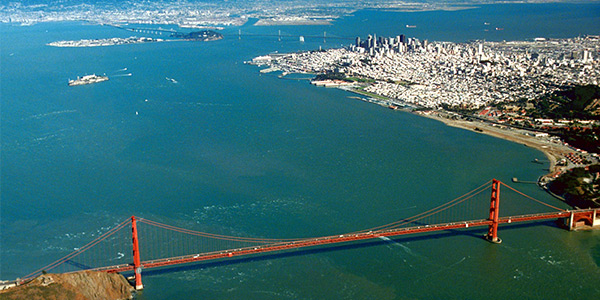By Hudson Sangree
FERC was skeptical Thursday of a proposal by the new owner of a submarine transmission cable running under San Francisco Bay for an increase in its transmission revenues and a $10 million annual reserve for 50 years in case of wildfires (ER19-2846).
In September, Trans Bay Cable, now owned by NextEra Energy Transmission, proposed revising its transmission owner tariff to increase its annual transmission revenue requirement from $133.9 million to about $157.3 million. It also sought to extend an incentive return on equity adder of 13.5% based on its unique benefits to the San Francisco Bay Area. (See FERC OKs Trans Bay Cable Sale to NextEra.)
The company argued that “the project provides significant benefits to consumers that outweigh Trans Bay’s total TRR and displace the need for in-city generation [in San Francisco],” FERC said. “Specifically, Trans Bay states that the project provides between $143 million and $261 million in societal and ratepayer benefits per year.”
In addition, Trans Bay “proposes in the instant filing to collect a reserve fund of approximately $10 million per year over the next 50 years to address the uninsured [wildfire] risk, which according to Trans Bay amounts to at least $463 million,” FERC said.
Trans Bay operates a 53-mile, 400-MW transmission line buried beneath the bay, with converter stations at either end, in San Francisco and the city of Pittsburg.
“Trans Bay notes that while the project’s design limits wildfire risk, it cannot wholly prevent fire ignition resulting from its equipment due to its location, particularly related to the possibility of a fire at its Pittsburg converter substation,” FERC wrote.
Protesters, including a group of six cities on the bay and the California Public Utilities Commission, challenged the 13.5% ROE adder and the wildfire reserve fund.
“Six Cities and CPUC note that the project’s location underwater reduces wildfire risk, and that the urban nature of the above-ground components suggest low risk,” FERC wrote.
The company has received a 13.5% ROE adder since its start in 2005. But the CPUC and others argued that “since Trans Bay is no longer a start-up company or independent transmission company after its acquisition by NextEra [last spring], it no longer qualifies for an incentive ROE, and that the commission should instead apply a base ROE.”
FERC preliminarily agreed with the protesters.
“Our preliminary analysis indicates that Trans Bay’s proposed TRR has not been shown to be just and reasonable and may be unjust, unreasonable, unduly discriminatory or preferential, or otherwise unlawful,” the commission wrote. “Trans Bay’s proposed TRR, including the requested 13.5% ROE and the establishment of a wildfire risk reserve fund, raises issues of material fact that cannot be resolved based upon the record before us.”
FERC accepted the company’s proposed TRR, suspended it for the maximum five-month period, subject to refund, and set all issues for hearing and settlement judge procedures.
A settlement judge must report to FERC on the parties’ progress within 30 days.





